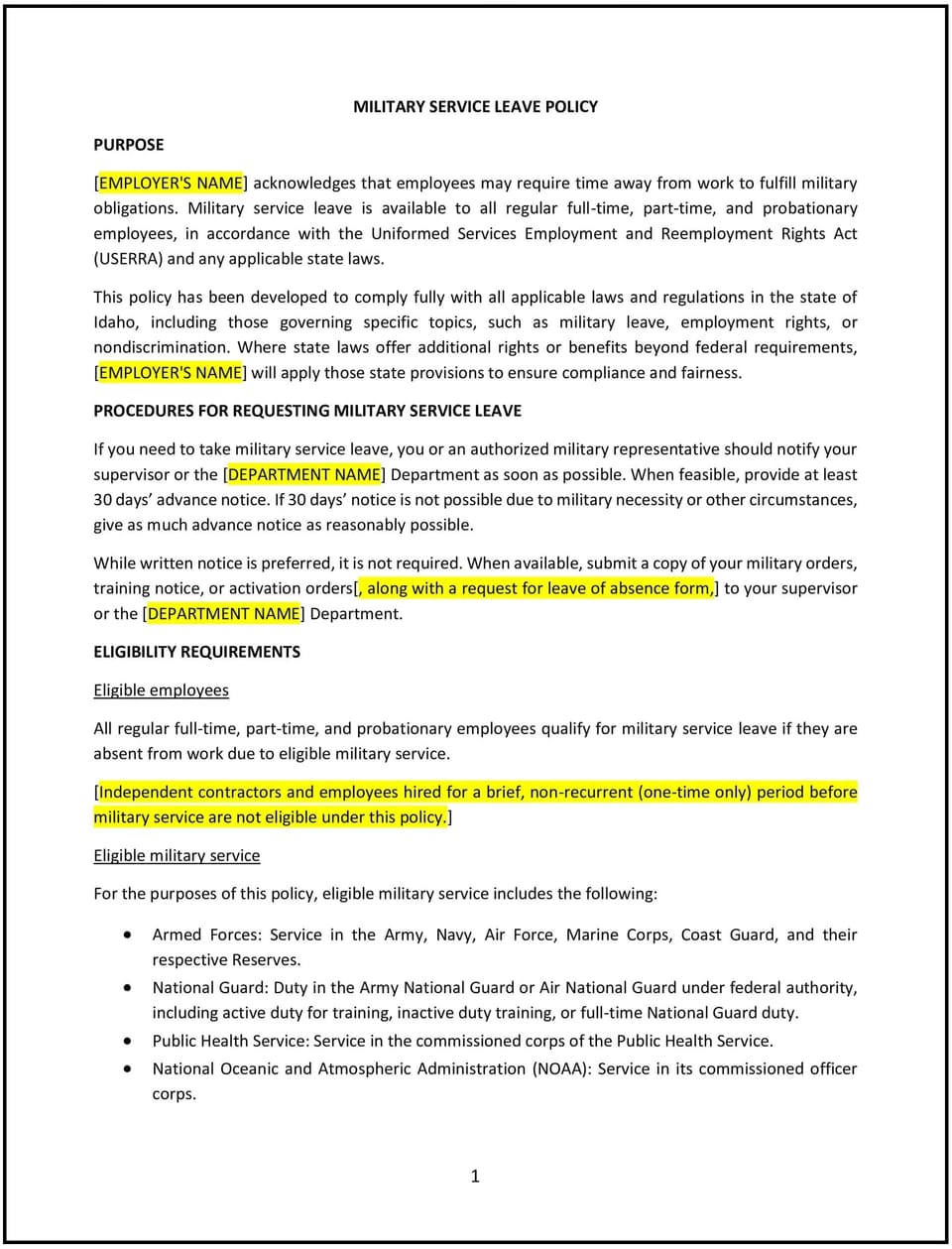Military service leave policy (Idaho): Free template

Military service leave policy (Idaho)
A military service leave policy helps Idaho businesses support employees who are called to active duty or training in the uniformed services. This policy outlines the process for requesting leave, job protection rights, and benefits available to employees during their military service. It also emphasizes the business’s commitment to honoring employees’ service and complying with federal and state laws, such as the Uniformed Services Employment and Reemployment Rights Act (USERRA).
By implementing this policy, businesses can demonstrate their support for employees serving in the military, maintain compliance with legal requirements, and foster a culture of respect and patriotism.
How to use this military service leave policy (Idaho)
- Define eligibility: Specify which employees are eligible for military service leave, including full-time, part-time, and temporary workers. This ensures clarity and consistency in applying the policy.
- Outline the request process: Provide clear instructions for employees to notify the business of their military service obligations, including required documentation and advance notice timelines.
- Address job protection: Reassure employees that their job will be protected while they serve, as required by USERRA and Idaho state laws. This includes reinstatement to the same or a comparable position upon their return.
- Detail benefits during leave: State whether the business will provide paid or unpaid leave during military service and outline any continuation of benefits, such as health insurance or retirement plans.
- Communicate reemployment rights: Explain the process for employees to return to work after completing military service, including timelines and any necessary documentation.
- Train managers: Provide training for managers on how to handle military service leave requests, including compliance with USERRA and Idaho state laws.
- Document everything: Maintain records of leave requests, approvals, and reemployment actions to ensure accountability and transparency.
Benefits of using this military service leave policy (Idaho)
This policy offers several advantages for Idaho businesses:
- Demonstrates support for military service: The policy reflects the business’s commitment to honoring employees’ service and fostering a culture of patriotism.
- Builds employee trust: Providing clear guidelines and job protection during military service fosters trust and loyalty among employees.
- Maintains compliance: The policy helps businesses adhere to USERRA and Idaho state laws, reducing the risk of legal disputes.
- Enhances workplace morale: Employees appreciate businesses that support their military obligations, leading to higher job satisfaction and morale.
- Streamlines operations: Clear policies minimize disruptions by providing a structured process for managing military service leave requests.
- Promotes fairness: A consistent policy ensures all employees are treated equally when requesting military service leave.
Tips for using this military service leave policy (Idaho)
- Communicate the policy effectively: Share the policy with employees during onboarding and through internal communication channels to ensure awareness and understanding.
- Train managers: Provide training for managers on how to handle military service leave requests, including documentation requirements and reemployment rights.
- Monitor leave requests: Keep track of military service leave requests to ensure consistency and fairness in applying the policy.
- Review legal updates: Stay informed about changes to USERRA or Idaho state laws regarding military service leave and update the policy as needed.
- Encourage transparency: Foster open communication with employees about their military service obligations and the support available to them.
- Document everything: Maintain records of leave requests, approvals, and reemployment actions to ensure accountability and compliance.
Q: Why should Idaho businesses have a military service leave policy?
A: A military service leave policy provides clear guidelines for employees and demonstrates the business’s commitment to supporting employees serving in the military while maintaining compliance with legal requirements.
Q: What laws govern military service leave in Idaho?
A: Military service leave is governed by the federal Uniformed Services Employment and Reemployment Rights Act (USERRA) and applicable Idaho state laws, which protect employees’ jobs and benefits during military service.
Q: How should businesses handle military service leave requests?
A: Businesses should require employees to provide advance notice of their military service obligations and any necessary documentation, such as orders or training schedules.
Q: Are businesses required to pay employees during military service leave?
A: USERRA does not require businesses to pay employees during military service leave. However, businesses should clearly state their pay practices in the policy, whether it’s unpaid leave or the use of PTO.
Q: What reemployment rights do employees have after military service?
A: Employees are entitled to reinstatement to the same or a comparable position upon their return, provided they meet USERRA’s eligibility criteria, such as timely notification and length of service.
Q: How can businesses prepare for an employee’s military service leave?
A: Businesses should plan for potential absences by cross-training employees, adjusting workloads, or arranging temporary coverage to minimize disruptions.
Q: How often should businesses review their military service leave policy?
A: Businesses should review the policy annually or as needed to ensure it aligns with current USERRA regulations, Idaho state laws, and business practices.
This article contains general legal information and does not contain legal advice. Cobrief is not a law firm or a substitute for an attorney or law firm. The law is complex and changes often. For legal advice, please ask a lawyer.


